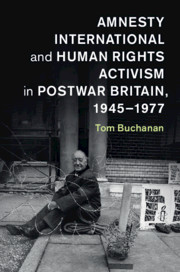Book contents
- Amnesty International and Human Rights Activismin Postwar Britain, 1945–1977
- Human Rights in History
- Amnesty International and Human Rights Activism in Postwar Britain, 1945–1977
- Copyright page
- Dedication
- Epigraph
- Contents
- Preface and Acknowledgements
- Abbreviations
- Introduction
- 1 Dawn: 1934–1950
- 2 Africa, Decolonisation and Human Rightsin the 1950s
- 3 Political Imprisonment and Human Rights, 1945–1964
- 4 The Early Years of Amnesty International, 1961–1964
- 5 ‘The Crisis of Growth’: Amnesty International 1964–1968
- 6 1968: the UN Year for Human Rights
- 7 Torture States: 1967–1975
- 8 ‘All Things Come to Those Who Wait’: the Later 1970s
- Conclusion: the Winds of History
- Notes
- Bibliography
- Index
7 - Torture States: 1967–1975
Published online by Cambridge University Press: 10 April 2020
- Amnesty International and Human Rights Activismin Postwar Britain, 1945–1977
- Human Rights in History
- Amnesty International and Human Rights Activism in Postwar Britain, 1945–1977
- Copyright page
- Dedication
- Epigraph
- Contents
- Preface and Acknowledgements
- Abbreviations
- Introduction
- 1 Dawn: 1934–1950
- 2 Africa, Decolonisation and Human Rightsin the 1950s
- 3 Political Imprisonment and Human Rights, 1945–1964
- 4 The Early Years of Amnesty International, 1961–1964
- 5 ‘The Crisis of Growth’: Amnesty International 1964–1968
- 6 1968: the UN Year for Human Rights
- 7 Torture States: 1967–1975
- 8 ‘All Things Come to Those Who Wait’: the Later 1970s
- Conclusion: the Winds of History
- Notes
- Bibliography
- Index
Summary
During the late 1960s and early 1970s activists became deeply concerned about the increasing use of torture by states, and this swiftly became a central issue for their activities. The chapter begins with a discussion of the campaigns against torture in Greece, Chile and Spain. This is followed by a major re-evaluation of Amnesty’s decision to launch an international campaign for the abolition of torture in 1973, emphasising the significance of the role played by the Quaker activist Eric Baker. The final section examines the Soviet Union’s decision to place political opponents in psychiatric hospitals, a practice that was seen by activists as an act of torture. The chapter argues that the campaign against torture marked a relaunching of Amnesty International, and, indeed, of human rights activism more generally.
Keywords
- Type
- Chapter
- Information
- Publisher: Cambridge University PressPrint publication year: 2020

